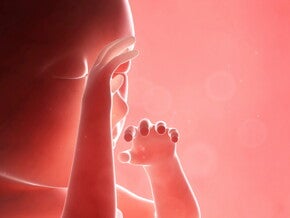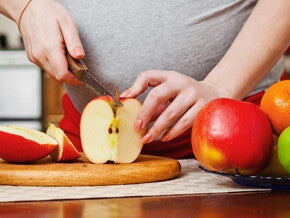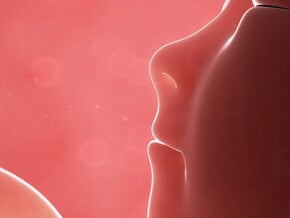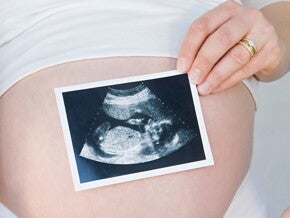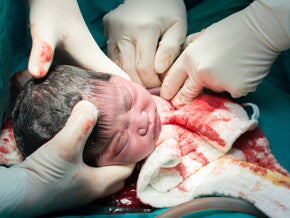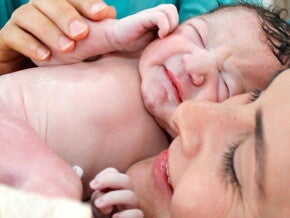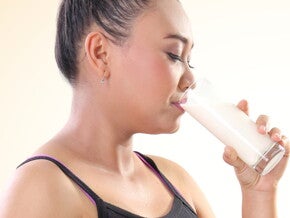
Nutrition during pregnancy
By taking responsibility for your body, you can maximise your level of wellbeing and enjoy good health.
Good nutrition is of the utmost importance during your pregnancy
Expecting a baby is one of the most joyful experiences in life. However, this is also a time of great change and challenges, in particular for your body, because it is housing and developing another life. For this crucial period, it is very important to supply your body with the most balanced and complete essential nutrients. During pregnancy your nutritional requirements change significantly and it is important that you eat a healthy and balanced diet so you can provide you and your developing baby with everything he/she needs.
A woman’s body
A woman’s body absorbs more nutrients from food than usual while pregnant, so eating a variety of foods will ensure you and your baby get the right balance of vitamins and nutrients. Being pregnant does not mean eating “for two”, as it’s the quality, not the quantity, of food you eat that is important. So, it is important to adopt a healthy, balanced diet which includes nutrient-rich foods such as fruits, vegetables, whole grains, lean meat, poultry and low fat dairy products. Later in pregnancy, especially in the third trimester, you may notice your appetite increases, but you only need about 200 extra calories a day, which is the equivalent of two or three pieces of fruit or two slices of bread to curb your cravings.

You have just found out you are pregnant and wondering what you should be eating. Maternal nutrition during pregnancy has an important influence on the progression and outcome of your pregnancy and importantly a complete set of micronutrients is needed for the normal development of your baby, together with ensuring your wellbeing and health. A healthy diet during pregnancy is very similar to the diet of the general population and so a well balanced diet should include foods from all the food groups:
Milk and Dairy Products
Try to drink milk every day. It is an excellent source of protein and calcium which is needed to help maintain strong bones. If you don’t like the taste of milk, try using milk in puddings, custards and sauces, or on cereals. Alternatively, dairy products, such as one carton of yoghurt or an ounce (28.35 g) of hard cheese are another good source of calcium.
Proteins and Iron (Meat, Poultry, Fish, Eggs)
15% of the calories we eat each day should come from protein. You don’t have to eat expensive cuts of meat as the cheaper cuts can be just as good for you, but remember to trim off excess fat. Beans, peas and lentils are also good sources of protein and iron, especially for vegetarians, and the magnesium contributes to normal nerve functions. Oily fish such as mackerel and salmon, as well as being good sources of Omega-3, help you to meet your increasing DHA needs during pregnancy and contain vitamin D, which helps your body absorb calcium and is important for healthy bones.
Fruit and Vegetables
Try to eat at least 5 – 6 portions every day as these are excellent sources of vitamins, minerals and fibre. Fresh, frozen and canned vegetables are all good for you but remember not to overcook them, as this destroys the vitamin content. Excellent fruit choices include apricots, blueberries, cherries, grapefruit or grapefruit juice, grapes, kiwi, mango, pear, pineapple, raspberries, blackberries, strawberries, oranges and naartjies. The vitamin C found within fruits and vegetables helps maintain a healthy immune system which is particularly important at this time. Additionally, the magnesium found in green leafy vegetables helps maintain strong bones.
Breads and Cereals
Fibre and B vitamins are provided by foods such as potatoes, pasta, rice and breakfast cereals. Try to eat some whole grain bread and cereals every day, as they are high in fibre and provide a nutritious source of energy. Fibre can also help to prevent constipation, but remember to drink plenty of fluids with these high fibre foods. B vitamins contribute to a healthy immune system and help maintain normal blood formation, which is important for the blood supply during pregnancy.
Fats and Oils
It is recommended that you use unsaturated fats such as olive oil, sunflower oil and margarine, rather than butter. Try to limit the amount of fat in your diet as too much can lead to weight problems.
Other Essential Vitamins
An appropriate multivitamin/multimineral like Nestlé MATERNA® or Nestlé® MATERNA DHA preconceptional vitamin intake is important for the normal development and growth of your baby. All nutrients play some role, but there are several specific nutrients that are especially important during the three stages of pregnancy. Good nutrition is of the utmost importance during your pregnancy.
Folic Acid

Folic acid, also known as vitamin B9, is a water soluble B vitamin that your developing baby uses every day to help build healthy cells. The synthetic form of folic acid can be found in prenatal multivitamins, fortified bread and maize products, while the natural form can be found in foods such as leafy green vegetables, beans and orange juice.
Folic acid is indispensable for cell production and normal growth of your baby during pregnancy, and it is recommended for the prevention of neural tube and other birth defects. Research has shown that consuming 400 mcg folic acid, plus additional food folate from food intake, can reduce the risk of neural tube defects by 50 – 70%. Consuming adequate amounts of folic acid as part of your healthy diet, may help ensure the normal development of the foetal spinal cord.
It is important to start supplementation with folic acid at least 4 weeks prior to conception as the neural tube, which later forms into the spinal cord and brain, closes around 24-28 days after conception. This is often before most women even know that they are pregnant.
Research has shown that the use of multivitamins containing folic acid were more effective for the reduction of Neural Tube Defects (NTDs) than a high dose of folic acid alone.
Vitamin A
The principal food sources of vitamin A are firstly those that are animal-derived such as liver, dairy products, eggs, fish and margarine. These foods contain a form of vitamin A termed preformed vitamin A (retinol). Retinol is one of the most well-absorbed and efficiently used forms of vitamin A by the body. Plant sources of vitamin A are termed provitamin A carotenoids and are derived from certain types of fruit and vegetables, for example carrots and yellow/orange-coloured fruits. Carotenoids such as beta-carotene are converted into retinol by the body, only as it is needed.

Vegetarians/vegans who do not consume eggs and dairy foods need to therefore ensure they consume foods rich in carotenoids to meet their vitamin A requirements. Vitamin A is essential for the development and growth of the foetus, and optimal levels are essential. Both excesses and deficiencies of vitamin A in retinol forms have serious consequences for pregnancy outcomes. As beta-carotene is only converted by the body into vitamin A as it’s needed, the US FDA currently recommends that pregnant women obtain vitamin A from foods containing beta-carotene.
Zinc
Zinc is important for normal cell division and DNA synthesis, and is especially important for the development of your baby’s immune system. Zinc deficiency limits foetal growth and, if severe, causes disfiguring birth defects. The dietary requirements for zinc increases during pregnancy. Zinc can be found in meat, fish and dairy products.
Calcium and Vitamin D
Pregnant women have an increased need for calcium, primarily to support the skeletal development of the baby. Calcium contributes to bone and teeth development and strength and also contributes to normal blood clotting and muscle function, while aiding in the transmission of nerve signals. The average calcium demand of a developing baby is 30 g at the time of birth. 80% of the calcium your baby needs is acquired during the third trimester.
So, if you don’t have adequate dietary calcium before conception or during pregnancy, significant maternal bone density could be lost, possibly putting you at risk for osteoporosis later in life. Milk and dairy products are the richest food sources of calcium and the best quality ones in terms of absorption; other good food sources include nuts, fish and certain vegetables such as broccoli. Vitamin D is crucial for the absorption of calcium for healthy bones and teeth. The primary sources of vitamin D are fatty fish (sardines, salmon, tuna, herring), margarine, dairy products, eggs, liver and beef. However, diet is not the main source through which vitamin D is accumulated in the human body; the majority of this vitamin originates in the exposure of skin to the sun.
Magnesium
Magnesium can contribute to normal muscle and nerve function, as well as maintenance of normal bones and teeth. It can be found in green, leafy vegetables, Brazil nuts, almonds and quinoa.
Vitamin B12
Vitamin B12 contributes to normal red blood cell formation, which is important for blood supply during pregnancy, and also helps maintain a normal immune system and energy metabolism. It can be found in fish, poultry and meat.
Iron
Iron is essential for the synthesis of haemoglobin – the protein in red blood cells that carries oxygen to other cells. Iron also contributes to the normal function of the immune system and is important for maintaining your health and reducing the risk of infection.
Iron can be found in fortified cereals, beans, lentils, beef and eggs. An iron deficiency could lead to anaemia – it is estimated that 47,4% of pregnant women suffer from anaemia, compared with 30,2% in non-pregnant women.
Supplementation with iron could help to reduce this risk, and the dietary requirements increase during pregnancy.
Iodine
During pregnancy, increased levels of iodine are recommended. Iodine is essential for the production of thyroid hormones in both mom and baby, and is important for normal development and metabolic processes. Iodine deficiency can adversely affect cognitive development of the baby, decreasing Intelligence Quotient (IQ) on average by a dozen points. Severe deficiencies can result in mental retardation and birth defects. Iodine is found in iodised salt and fish.
Omega-3 Fatty Acid DHA

DHA (Docosahexaenoic Acid) is a polyunsaturated fatty acid belonging to the group of so-called Omega-3 fatty acids.
Your daily intake of DHA is crucial for you and your baby as your body can convert it only in very small quantities from vegetarian oils such as linseed oil or grape seed oil. The supply of DHA to your baby is linked to your baby’s development. Your intake of DHA supports the visual and cognitive development and mental balance of your baby.
This is because DHA plays a major role in early brain, visual and nervous system development of the foetus and is important for the foetus especially when the brain undergoes periods of rapid growth from the second trimester. Experts recommend an average intake of 200 mg DHA per day with a ratio of DHA to EPA (Eicosapentaenoic Acid) – another unsaturated fatty acid – approximately 5:1. The effects of DHA will be beneficial for your growing baby from the second trimester right through to breastfeeding, so you should ensure you are including DHA-rich foods into your diet or supplementing with a DHA fish oil capsule such as Nestlé MATERNA® DHA.
What Not to Eat During Pregnancy
There are certain foods to avoid during pregnancy, which include:
- Unpasteurised cheeses, soft cheeses and blue-veined cheese. Brie, camembert, goat’s cheese and stilton may contain listeria, a type of bacteria that can be harmful to your baby.
- Soft boiled eggs or eggs used in raw foods. Avoid homemade mayonnaise and desserts such as mousses to prevent the risk of salmonella food poisoning.
- Raw or undercooked meat. Make sure meat is not pink in the middle before you eat it. It is also important to wash your hands after touching raw meat to avoid contamination with other foods and to help prevent the spread of harmful bugs such as salmonella, Campylobacter and E. coli. Ready meals should be heated until they are piping hot all the way through.
- Oysters and shellfish may contain harmful bacteria and viruses that can cause food poisoning.
- Limit foods high in retinol forms of vitamin A, such as liver, liver pate and supplements containing vitamin A, such as fish liver oils, as too much vitamin A can harm your baby.
- Limit foods high in fat and sugar such as biscuits and cakes.
- Alcohol, recreational drugs and tobacco all have the potential for negative side effects in your baby.
- Caffeine – coffee, tea, cola and some other soft drinks, chocolate and some non-prescription drugs which contain caffeine. You don’t need to cut out caffeine completely, but you should limit your caffeine to no more than 200 mg per day. This is equivalent to approximately two cups of tea.
- Shark, swordfish and marlin should be avoided as they contain too much mercury.
Special circumstances
Although good nutritional standards are important in all pregnancies, you should be especially conscientious about your diet if any of the following apply to you:
- Multiple pregnancies.
- Adolescent pregnancy.
- Pregnancies in rapid succession.
- Vegetarian diet.
- Food allergies.
- Medical problems, such as diabetes.
- Anaemia, heart or lung disease.



